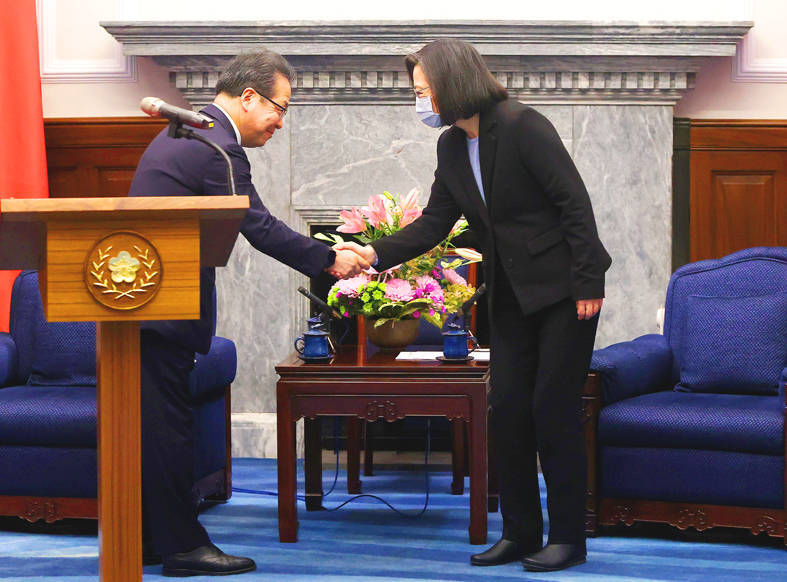《TAIPEI TIMES》 Taiwan, Japan should join forces: Tsai

President Tsai Ing-wen, right, shakes hands with Japanese lawmaker Hiroshige Seko at the Presidential Office in Taipei yesterday. Photo: CNA
‘EXTREMELY IMPORTANT’: Taiwan’s decision to revamp its military makes it clear that the nation intends to take charge of its self-defense, a Japanese lawmaker said
By Jason Pan / Staff reporter
Taiwan and Japan should join forces with other democracies to safeguard regional security, President Tsai Ing-wen (蔡英文) yesterday told a visiting Japanese delegation, whose members lauded Taipei’s decision to revamp it military service.
Tsai said that Taiwan seeks to deepen security arrangements and bolster ties with Japan as she met with the delegation at the Presidential Office in Taipei.
The nation would also engage in closer cooperation with democratic countries such as Japan, the US and European nations, to serve the common goals of maintaining peace and security, and to achieve free trade and economic prosperity in the Indo-Pacific region, she said.
Taiwan is also seeking to join the Comprehensive and Progressive Agreement for Trans-Pacific Partnership, and asks Japanese lawmakers to support the nation in its bid, Tsai said.
The two sides discussed Japan’s revision of three key national security documents amid increasing threats from China to imply that Tokyo could act on “contingencies” around Taiwan, which lies about 100km from Okinawa Prefecture’s westernmost island.
Tsai said Taiwan welcomes the revision and reiterated that the nation would take responsibility for its self-defense, adding that on Tuesday she announced a move to expand mandatory conscription to one year and that her government would make other changes to the military’s composition.
In the revamped national defense plan, Taiwan is to bolster its reservist system and is considering establishing a civilian militia, while those who have signed up as professional soldiers would form the main body of the armed forces.
Japanese lawmaker Hiroshige Seko, who heads the delegation, through an interpreter lauded the new defense plan.
“We learned of President Tsai’s announcement of the major policy change on Taiwan’s national defense yesterday... Along with restoring mandatory military service to one year, she also presented programs to strengthen the armed forces and enhance Taiwan’s defense capability,” Seko said.
The new plan also includes increased spending for weapons procurement and the purchase of next-generation missile systems, signaling Taiwan’s resolve to take charge of its self-defense.
Seko said that Tsai “made this clear with the new military policy, which I shall give very high praise.”
Japan’s latest national defense paper has made it clear that Tokyo would not tolerate unilateral changes to the “status quo” in the Taiwan Strait, Seko said.
He said Japan recently revised its National Security Strategy, with a pledge to significantly increase defense spending to boost its military capability and preparedness, and to respond to contingencies in the region.
In the strategy document approved on Dec. 16, Japan designated Taiwan as an “extremely important partner,” Seko said, adding that the Japanese government attaches great importance to maintaining peace and stability in the Taiwan Strait.
Separately, the White House in a statement welcomed Taiwan’s pledge to revamp its military, saying that it underscores “Taiwan’s commitment to self-defense and strengthens deterrence.”
A White House spokesperson said the US “will continue to assist Taiwan in maintaining a sufficient self-defense capability in line with our commitments under the Taiwan Relations Act and our one China policy.”
“The United States will continue to support a peaceful resolution of cross-Strait issues, and oppose any unilateral changes in the status quo by either side,” they said.
新聞來源:TAIPEI TIMES












